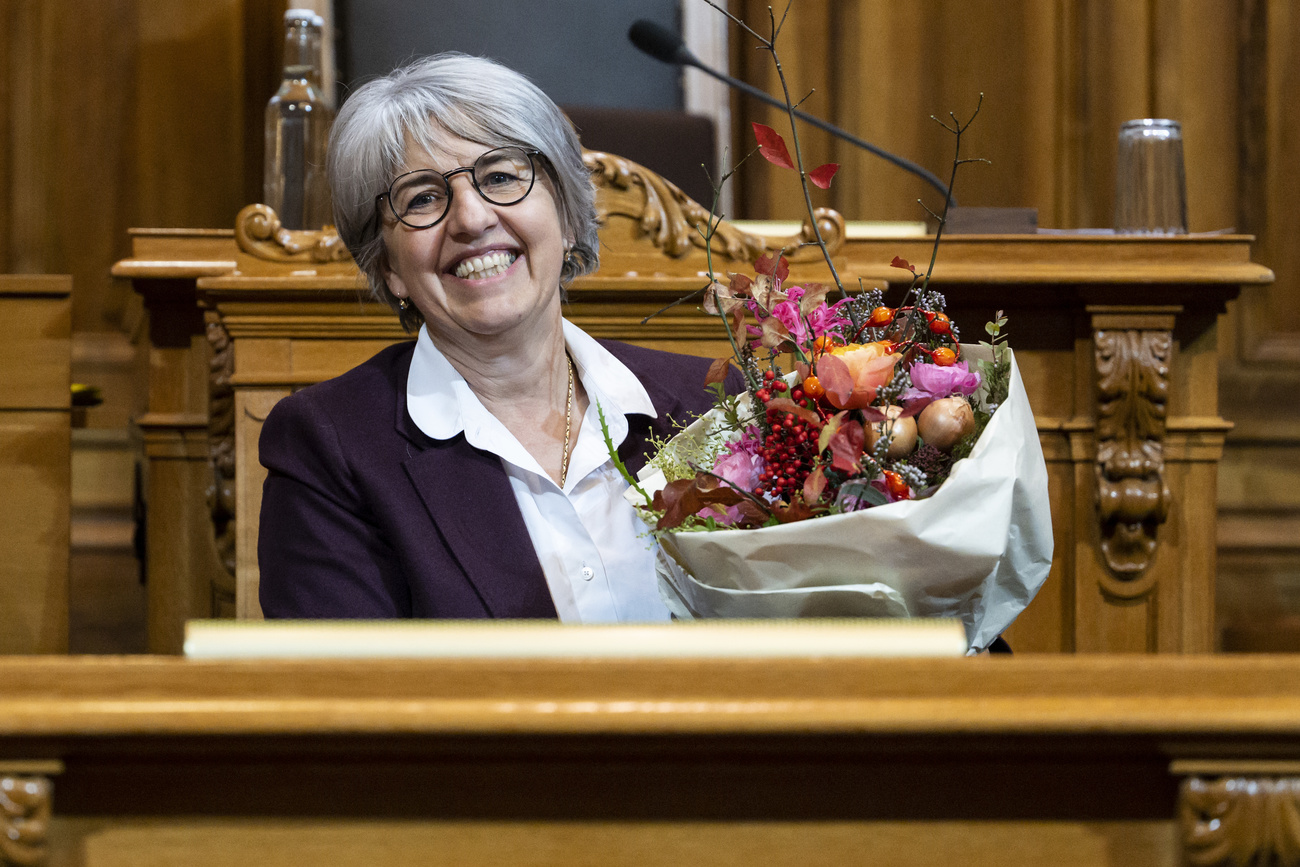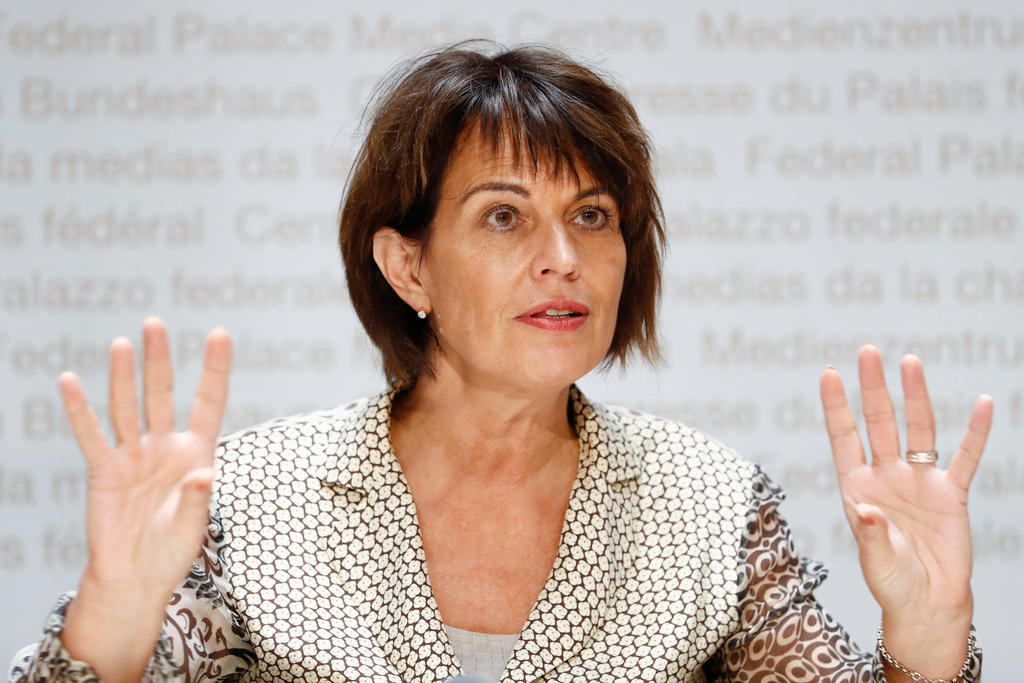Two women for government: who are Switzerland’s new ministers?

On Wednesday morning, Karin Keller-Sutter and Viola Amherd were elected to Switzerland’s seven-member executive body – who are the new government ministers?
After months of debates around gender, geography, language skills, and a healthy dose of party politics, the race to replace two outgoing Federal Councillors – ministers, in other words – came to an end in parliament on Wednesday.
The clear winners, who will become just the eighth and ninth women to sit in government since 1848, are Radical-Liberal Karin Keller-SutterExternal link (who replaces Johann Schneider-Ammann) and Christian Democrat Viola AmherdExternal link (replacing Doris Leuthard).

More
Viola Amherd and Karin Keller-Sutter elected to government
From interpreter to minister
Who are they? Gender, approximate age, competency, and a concern for the environment link the two, according to Nenad Stojanovic of the University of Geneva. But aside from this, their political profiles (Keller-Sutter on the right, Amherd in the centre) differ.
Keller-Sutter, a 54-year-old trained translator from canton St Gallen, was tipped from the start to take her party’s government seat.
Elected to the Senate in 2011 after more than a decade spent directing the police and justice department of her home canton, Keller-Sutter has since won admiration at national level for her competence, as well as a less-reported penchant for graft: “You can call me after work today, I work until 11pm anyway”, she once told a journalist during her St Gallen tenure.
A bilingual French and German speaker, Keller-Sutter sits on the more conservative end of her party’s spectrum. According to a 2015 survey, she holds tough positions on questions including citizenship laws, parental leave, and transparency in party financing; she is also known across Switzerland as a hardliner on asylum issues.
Previously, in 2010, she was also in the running to be selected as Federal Councillor before being pipped to the post by her outgoing Radical-Liberal colleague Johann Schneider-Ammann.
What changed in her favour in the interim? As well as the political timing being better for a woman from eastern Switzerland, Keller-Sutter has consolidated and managed her public image skilfully, appealing across the spectrum, while also building up extensive contacts and a reputation for consensus within parliament.
And she is endowed with a tenacity that, along with a modesty retained from years working as a conference interpreter, has won her respect and reputation. “I don’t want to be muzzled, like my dog!” she told the NZZ newspaper during the campaign. More recently, she has also commented on the fixation on gender during the election campaign, telling public broadcaster SRF: “I don’t just want to be a woman.”
Keller-Sutter has been involved in politics for two-and-a-half-decades, having been elected for the first time to the local parliament of Wil in 1992, at the age of 28.

More
How are Swiss government members elected?
Viola Amherd – legal expert
From the centrist Christian Democrats, meanwhile, where the race was expected to be tighter than among the Radical-Liberals, Viola Amherd from canton Valais was also resoundingly elected by parliament after just one round of voting.
The 56-year-old independent solicitor, who describes herself as a big fan of mountain hiking, has been a parliamentarian since 2005, and is well known at the federal level where she is often described as “discrete”.
She is “very centrist, looks for consensus, and can build bridges”, said Social Democrat parliamentarian Jacques-André Maire. “She is very open on the societal level, as well as being outward-looking, and she has said that she’s keen to reach agreement with the EU”.
Overall, her profile is indeed rather centrist, though her positions vary on some key current debates, according to a 2015 smartvote poll: liberal when it comes to adoption rights for homosexual couples, as well as promoting large-scale building of renewable-energy infrastructure, she is nevertheless opposed to an extension of the carbon tax and proposals to legalise cannabis.
Like Keller-Sutter, she has links to business, and sits on the executive board of the GSMN group of private clinics, as well as railway companies BLS and the Matterhorn Gotthard Bahn. She is also linked with several companies developing fibre-optic networks.
Amherd was a member of the government of her home municipality of Brig-Glis from 1992 to 2012. Her victory on Wednesday comes at the expense of Heidi Z’graggen, whose profile soared in recent weeks but whose lack of national experience ultimately meant she was unable to muster enough support to become the first ever Federal Councillor from canton Uri.
Amherd takes the seat following the resignation of the popular and charismatic Doris Leuthard, who spent 12 successful years in the government. Her Christian Democrat party, which has lost some support in recent years and has sometimes suffered from internal divisions, will be hoping that Amherd’s profile will help them rebound in time for national elections next year, where they are expected to emerge as one of the biggest losers.
Both Keller-Sutter and Amherd – whose portfolios will be announced sometime after today’s election – will take up their posts on January 1, 2019.

More
Women in the Federal Council – a history

In compliance with the JTI standards
More: SWI swissinfo.ch certified by the Journalism Trust Initiative




You can find an overview of ongoing debates with our journalists here. Please join us!
If you want to start a conversation about a topic raised in this article or want to report factual errors, email us at english@swissinfo.ch.